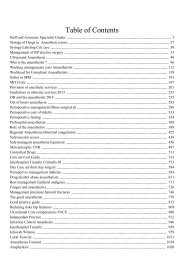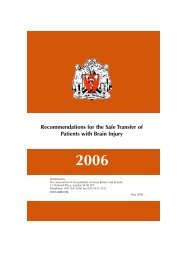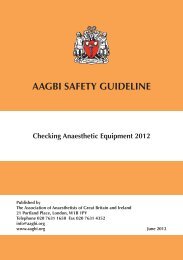TheatrePracticeStandardsGeneric1
You also want an ePaper? Increase the reach of your titles
YUMPU automatically turns print PDFs into web optimized ePapers that Google loves.
Generic Theatre Standard No 06D Management of Patients with<br />
Glycopeptide Resistant Enterococci (GRE) in the Operating Theatre<br />
Department<br />
Standard Statement: All Theatre staff will have knowledge of the requirements for caring for<br />
patients with GRE into operating department to protect self, colleagues and patients from the risk<br />
of health care acquired infection.<br />
Enterococci are Gram positive bacteria that are commonly found in the bowel of humans and<br />
animals. They rarely cause infection. They are occasionally responsible for urinary tract infections<br />
(UTIs), often related to the use of indwelling catheters, and more rarely cholangitis, endocarditis<br />
and gut-related sepsis. Two main types are associated with human diseases: Enterococcus<br />
faecalis and Enterococcus faecium. Enterococcus faecium is more common to cause bacteremic<br />
infections.<br />
Glycopeptide resistant enterococci (GRE) are resistant to vancomycin, usually teicoplanin and<br />
often other antibiotics. During mid 1980s enterococci resistant to vancomycin emerged and<br />
therefore often termed as Vancomycin Resistant Enterococci (VRE). GRE usually tend to cause<br />
colonisation rather than infection but when they cause serious infection, they are difficult to treat<br />
because of less therapeutic option.<br />
Hospital outbreaks of GRE have been reported mainly from renal dialysis, transplant, haematology<br />
and intensive care units. Risk factors for colonisation and infection with GRE include previous<br />
antibiotic therapy (especially with glycopeptides, cephalosporins, or carbapenems),<br />
immunosuppression, prolonged hospital stay, and admission to intensive care, renal, haematology<br />
or liver units. Once gut colonisation has occurred, carriage can be prolonged and there is no<br />
effective means of eradication.<br />
General Considerations<br />
Please see the Glycopeptide Resistant Enterococci (GRE) Policy<br />
Generic Theatre Standard 04 - Infection control in the Operating Department<br />
• Staff risk Effective hand decontamination is the most important measure to prevent<br />
and control the spread of GRE. Portering staff do not need to wear protective clothing<br />
whilst transporting patients. They only need to wear protective clothing if there is any<br />
possibility of having close contact with the patient and they must decontaminate their<br />
hands after removal.<br />
• Patient position on list schedule DO NOT NEED to be last on list, however, to<br />
ensure robust cleaning, adequate, non-pressured time be allowed to the staff to clean<br />
effectively.<br />
• Hand Hygiene Effective hand decontamination is the most important measure to<br />
prevent and control the spread of GRE. Alcohol gel is effective on GRE, so should be<br />
used in all potential situations as recommended in the Standard Precautions policy.<br />
Hands must be decontaminated between each patient contact whether or not the<br />
patient is known to be colonised with GRE.<br />
• Personal Protective Equipment (PPE) Staff should use standard precautions after<br />
contact with urine or faeces to prevent spread. Staff must put on gloves when entering<br />
the theatre and wear a plastic apron if substantial contact with the patient or<br />
environmental surfaces is anticipated. PPE must be removed followed by hand<br />
washing before coming out of the patient zone<br />
35





